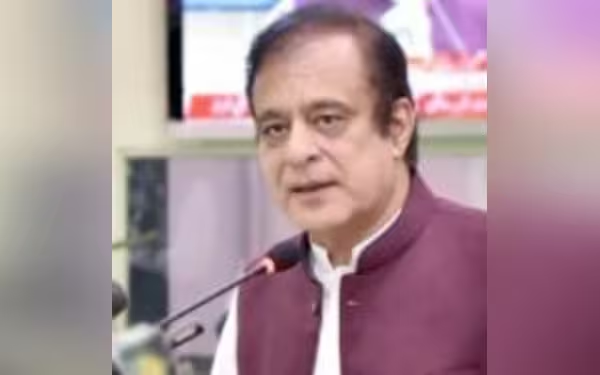Saturday, November 16, 2024 03:19 PM
Shibli Faraz Criticizes Government's Governance in Pakistan
- Shibli Faraz questions government's ability to maintain law and order.
- Criticism directed at Bilawal Bhutto for constitutional actions.
- PTI plans peaceful rallies to assert public mandate.
 Image Credits: pakistantoday
Image Credits: pakistantodayShibli Faraz criticizes the government's governance, questioning law and order and targeting Bilawal Bhutto's actions.
In recent times, Pakistan has witnessed a surge in political tensions, particularly concerning the governance of the country. The Leader of the Opposition in the Senate, Shibli Faraz, has raised significant concerns regarding the current government's ability to manage the nation's affairs effectively. He argues that the government, which he claims came to power through "backdoor channels," is struggling to maintain law and order, leading to a situation where the "rule of law has been replaced by the law of the jungle." This alarming statement reflects the growing frustration among opposition leaders regarding the state of governance in Pakistan.
During a press conference held on Friday, Shibli Faraz, accompanied by fellow Pakistan Tehreek-e-Insaf (PTI) leaders Rauf Hassan and Abu Zar Salman Niazi, criticized the government's handling of various issues. He specifically targeted Bilawal Bhutto, stating, "Shaheed Zulfiqar Ali Bhutto gave this nation political awareness and the 1973 Constitution. Today, his grandson is tearing apart the same constitution with his actions." This remark underscores the perceived hypocrisy in the current political landscape, where the legacy of past leaders is being questioned.
Faraz also took the opportunity to highlight the contributions of PTI's founder, emphasizing his role in strengthening Pakistan's defense and bringing international respect to the nation. He lamented the treatment of this leader, who he claims is being held in a "death cell," facing numerous restrictions, including limited contact with his family. "Despite advocating for the rule of law, the founder of PTI is being persecuted," Faraz stated, drawing attention to the apparent contradictions in the government's approach to justice.
Moreover, Faraz expressed his discontent with the government's disregard for judicial rulings, stating, "Judicial decisions are being ignored, and the state is failing in its duty to protect the life and dignity of its citizens." This assertion raises critical questions about the rule of law in Pakistan and the government's commitment to upholding citizens' rights. Faraz's comments suggest a growing concern that the government is not only failing to protect its citizens but is also actively undermining the legal framework that is supposed to safeguard them.
In addressing the allegations against PTI leaders, including Bushra Bibi, Faraz defended her as a non-political figure who is being unjustly targeted. He argued that the current government, unable to compete politically with PTI, resorts to suppressing opposition voices through various means. "This is not a political party, but a group of opportunists propped up by external forces," he asserted, indicating a belief that the current administration lacks legitimacy and support from the public.
As the political landscape continues to evolve, Faraz confirmed that PTI plans to hold peaceful rallies across the country, with a request for permission already submitted to the High Court. He emphasized the importance of acknowledging the public's mandate, stating, "The largest stakeholders in this country are its people." This statement serves as a reminder that the voice of the citizens is crucial in shaping the future of Pakistan.
The ongoing political turmoil in Pakistan raises significant questions about governance, justice, and the role of the opposition. As leaders like Shibli Faraz voice their concerns, it becomes increasingly clear that the path forward will require a commitment to the rule of law and respect for the democratic process. The citizens of Pakistan are watching closely, and their engagement will be vital in determining the future direction of the country.













